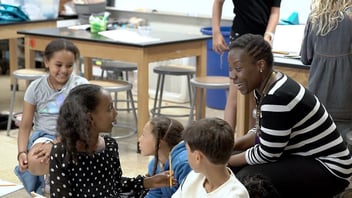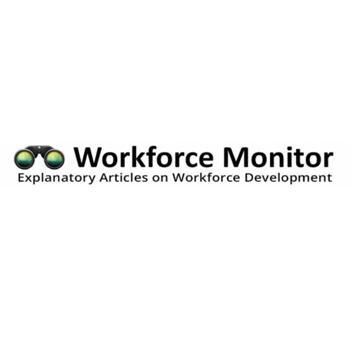Announcement | Reach Launches Required CS Course for All Preservice Teachers in K-12 Schools
199 REPRESENTATIVE CANDIDATES ENROLLED IN REACH’S INAUGURAL CS COHORT, RESULTING IN 93% ACHIEVING MASTERY & IMPROVED CONFIDENCE IN TEACHING CS
(OAKLAND, California) – December 8, 2023 – Reach University, the accredited non-profit university dedicated to advancing job-embedded degrees and credentials, today announced the implementation of an undergraduate computer science (CS) requirement for all preservice teachers. The inaugural CS cohort, comprising 199 educators employed in rural and low-income K-12 schools across four states, resulted in 93% of candidates mastering CS fundamentals aligned to state standards, an enhanced perception of the value of computer science, and overall improved confidence in teaching CS curriculum.
Reach’s undergraduate school of education – Oxford Teachers College – is the only educator preparation program (EPP) operating across multiple U.S. states to make computer science an undergraduate requirement for all preservice educators, regardless of applicable in-state CS mandates. According to Code.org, “while 23 states have state-level initiatives focused on preservice teachers, only five states – Arkansas, Connecticut, Indiana, Nevada, and Ohio – require preservice teachers to gain exposure to computer science.” Reach undergrads also complete a compulsory 15-credit hour math and computational thinking semester in part of their teacher training.
“Technology transcends every U.S. job, across every industry,” said Joe E. Ross, President of Reach University. “Yet, as we prepare learners for the roles of today and tomorrow, foundational computer science courses are only offered in a little over half of our nation’s high schools, with less than 6% of students enrolled in these courses. Rural and low-income schools are less likely to offer CS courses, exacerbating systemic equity and racial disparities in the field of STEM.”
“To break this cycle of underrepresentation, particularly in rural America, Reach University has implemented a required 3-credit hour course on computer science to ensure all Reach-trained educators can lead the classroom with CS know-how and confidence,” Ross continued. “The results of this inaugural cohort demonstrate that access and mastery can be achieved, regardless of a degree seeker's previous educational experience.”
Rural K-12 schools trail behind national counterparts in offering access to CS education. 42% of public schools are designated as “rural or small-town,” yet previous data shows only 10% offer AP computer science courses despite 86% of rural and small-town students recognizing they are likely to have a job requiring CS skills. Beyond limitations in curriculum offerings, continued specialized teacher shortages, specifically in rural and low-income communities, contribute to this systemic access inequity.
“More students attend rural schools - 9.5 million - than attend the top 100 largest U.S. school districts combined,” said Dr. Allen Pratt, Executive Director of The National Rural Education Association. “However, rural public schools struggle to recruit and retain qualified teachers, specifically in high-demand fields such as STEM and computer science. Reach University not only removes the access hurdles to recruiting representative rural educators, but also addresses the systemic subject- and grade-level needs of individual schools. The impact of teachers graduating from Reach with the equivalent of a minor in math, computational thinking and CS will be game-changing for both rural learners and their home economies.”
Reach University’s undergraduate CS course introduces candidates to the core concepts and practices common to the state and national standards for computer science. The curriculum builds teacher self-efficacy and pedagogical content knowledge through hands-on investigations of computing systems; data and analysis; networks and the internet; algorithms and programming; and impacts of computing.
“My time serving as the first CS Coordinator for the California Department of Education has informed Reach’s approach to foundational CS to ensure educators of all digital-literacy levels can master the content knowledge, coding skills, and pedagogical best practices,” said Dr. Emily Thomforde, Founding Chair & Faculty Lead for Computer Sciences at Reach University. “With CS-capable teachers, equipped to deliver on the promise of making CS equitable, inclusive, and integrated throughout a K-12 learning experience, states can achieve their vision of CS for all.”
The inaugural Summer ‘23 cohort was comprised of paraprofessionals working in K-12 schools across Reach’s partner districts in California, Louisiana, Arkansas, and Alabama. 97% of participants identified as female and 45% identified as educators of color. Comparatively, 42% of U.S. K-12 CS teachers are female and only 17% are Hispanic/Latino or Black/African American.
“Fostering a sense of belonging in STEM for underrepresented students is essential in achieving educational and career equity,” said Talia Milgrom-Elcott, Founder and Executive Director of Beyond100K. “Reach’s approach to teacher preparation presents a scalable model that intertwines access and representation with rigorous skill development. We are proud to support Reach in training thousands of computer-science-qualified teachers of color and empowering every learner to envision themselves thriving in the field of computer science.”
Although Reach’s course is geared towards building CS confidence and know-how for all grade levels, it is most focused on training elementary and middle school educators. Nationally, 30 states require schools to teach computer science, but only 17 require all K-12 schools to offer CS coursework.
Recent findings show that 53% of workers exposed to STEM curriculum between the ages of 5 and 8 years old are currently working in a role that either entirely or heavily involves STEM, demonstrating the correlation between early age exposure and career opportunity.
“Russellville City Schools places a high priority on meeting our students where they are, and creating an exceptional educational experience every step of the way,” said Dr. Heath Grimes, Superintendent of Russellville City Schools. “As the state of Alabama continues to implement its K-12 CS priorities, Russellville is working with Reach to equip our paraeducators - training to become teachers at all grade levels - with CS instructional skills and confidence. Paraeducator feedback on this course has been positive, and we’re eager to see additional teacher candidates move through the program throughout the coming year.”
Following its inaugural CS cohort, Reach deployed a graduate-level CS training course for its faculty in the fall of 2023. This instructor-focused course will be offered again in the spring of 2024, and faculty from any peer educator preparation program are invited to enroll. CS 300 will then be offered again to all Reach candidates in the summer of 2024, with an expected 500 enrollments across 20 sections and 10 instructors.
“My immediate thoughts on taking a computer science course and jumping into coding were ‘Nope, I can’t do it,’” said LaCamra Perry, a Reach teacher candidate and Director for the Preschool & Infant/Toddler Program in the Great Rivers ESC. “But then I realized that not only can I do it, I belong here. I learned things about myself that I didn’t know I was capable of doing, and that’s what I enjoyed the most. I took what was immediate resistance and transformed it into immediate embrace. And now, I code with my young students here in Great Rivers. That’s been the best part of my Reach experience. I learn and grow, and then my students learn and grow based upon what I just conquered in my own educational journey.”
To learn more about Reach University’s computer science courses and view the outcomes of its Summer ‘23 cohort, please visit www.reach.edu/computer-science. Reach’s Spring ‘24 cohort is open to any faculty member of a fellow EPP interested in enrolling.
LaCamra Perry, a Reach teacher candidate and Director in Arkansas' Great Rivers ESC, shares her experience in CS 300 and the key takeaways from her computer science experience.
Download the full media announcement:
For Release_CS 300 Announcement_Reach University_12.08.23.pdf
Download PDF • 150KB
ABOUT REACH UNIVERSITY
Reach University is the regionally accredited, non-profit university dedicated to advancing job-embedded degrees and credentials. Reach is actively solving America's teacher shortage by creating fully-embedded pathways for high-potential individuals to earn degrees, credentials and jobs as teachers within their own communities. By focusing on low-income, urban and rural regions, offering online tutorials and classes, and rendering academic credit for on-the-job experience, Reach University is eliminating barriers to entry in high-need professions, and building untapped pipelines of locally representative talent. Reach University currently operates in Alabama, Arkansas, California, Colorado, Louisiana, Mississippi, and Texas.
Media Inquiries:
Lauren Bauml, Reach University
(512) 923-6136
LBAUML@REACH.EDU


